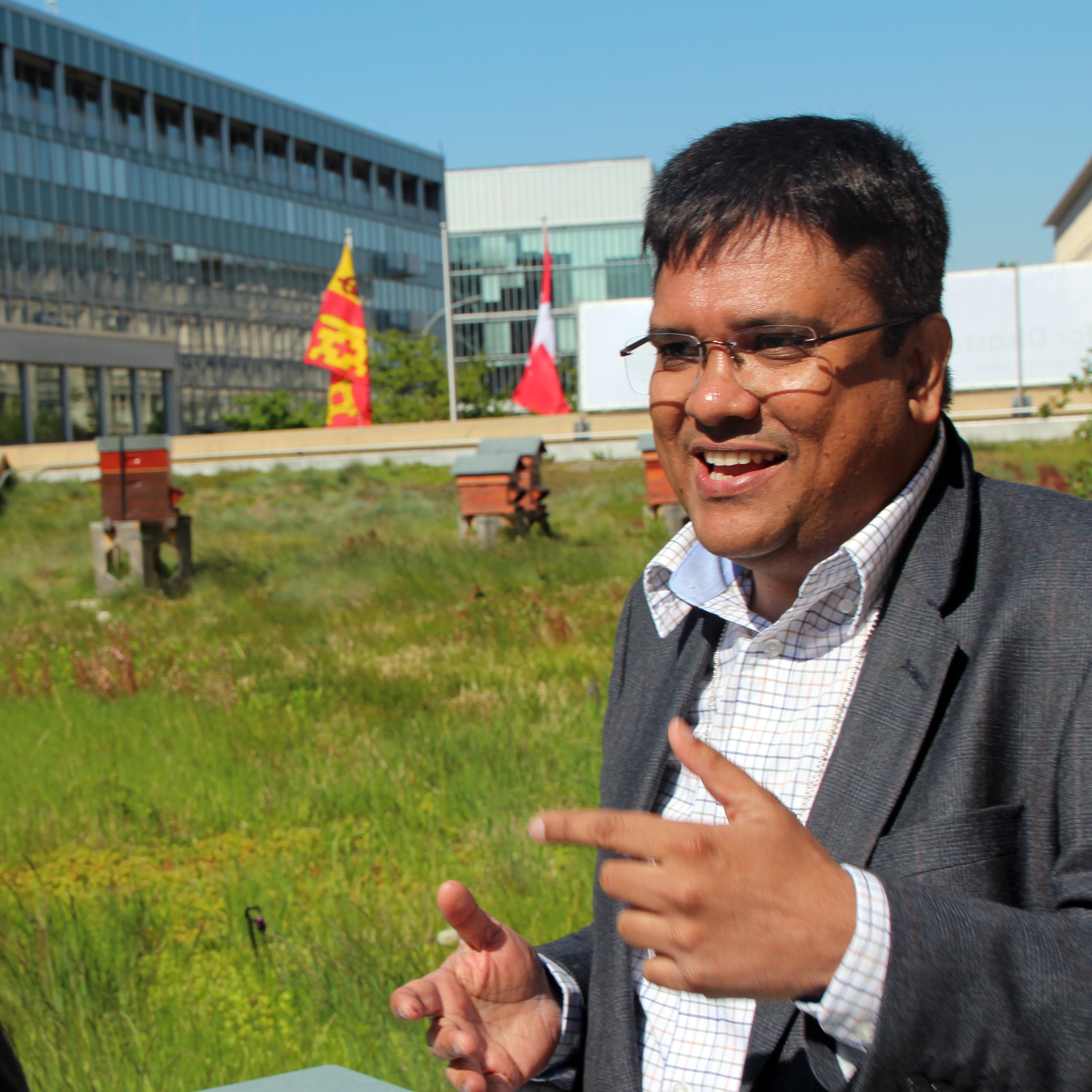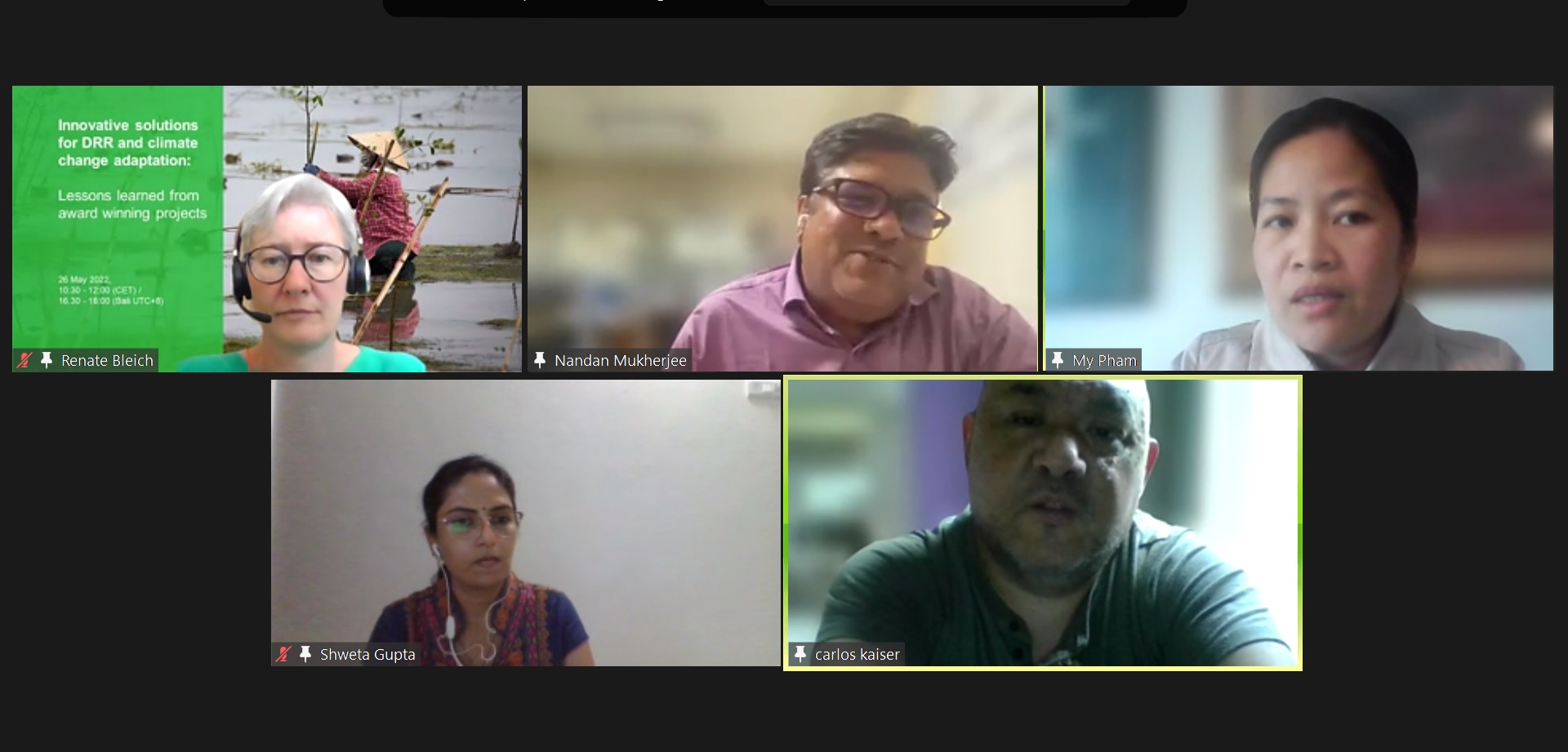The number of disasters is increasing worldwide. Population development, urbanisation, informal settlements and vulnerable infrastructures contribute to this, as do the consequences of climate change. Societies need to prepare and better protect their people. In this side event, we used four practical examples from Chile, India, Bangladesh and Vietnam to discuss what hurdles and solutions exist to increase resilience. The focus was on inclusive participation, cooperation with local governments and sustainable financing.
Carlos Kaiser, Director of ONG Inclusiva, began by explaining that even in today's modern world, many people are excluded from disaster risk reduction (DRR). Especially people with disabilities still face many barriers before they can benefit from inclusive risk management. Barriers need to be removed. These can be infrastructural barriers, but also communicative, social or political barriers. For example, in his pilot project on Inclusive Resilience for All, his project team taught sign language to rescue workers. Evacuation routes were checked for accessibility, including for wheelchair users, and much more. In future, representatives for people with disabilities are to be involved in all planning processes from the very beginning. Participation is important!
We have to de-mystify the DRR-jargon!
Shweta Gupta
All India Institute of Local Self Government (AIILSG), India
Executive Director International Center of EQUI-T and its CSR Centre
Here Shweta Gupta, AIILSG, agreed with him. Her project initially focused on the inclusion of women and children in slums and informal settlements in urban areas in India. These population groups are often excluded from risk training due to cultural reasons, but at the same time they are exposed to the same or even greater risks than men. This makes women much more vulnerable. To reach these groups, risk management and training had to be rethought. Language had to be simplified, written and teaching material translated into pictograms and pictures. Often, playful approaches, for example via theatre plays, helped. Thanks to this innovative approach, the role of women could be strengthened and even communities with little literacy could participate in risk assessment processes (community-self assessment).
Nandan Mukherjee, Dundee University, agreed. Community-led processes are more time-consuming and have to be much more individualised than solutions from the standard repertoire, but they promise more sustainable success in the long term. He emphasised that especially in the field of climate change, research and development must happen on a global level whereas the reduction of vulnerabilities and the understanding of solutions must take place locally. His project is about developing floatable, disaster-resilient houses in Bangladesh that can be paid for by low-income people. Again, the biggest challenge was not necessarily the technical development, but achieving social acceptance. The chosen building material bamboo offers many advantages: it is very robust, renewable, CO2-neutral and can be used in many ways in house construction. However, it is considered a building material for poor people. Therefore, acceptance must be worked on, especially in the social context. This is also best achieved through participatory processes. Patience is needed here!
Climate change research must happen on a global level whereas the reduction of vulnerabilities and the understanding of solutions must take place locally.
Nandan Mukherjee
The University of Dundee, UK/Bangladesh
Post-Doctoral Research and Communication Specialist in the UNESCO Centre for Water Law Policy and Science
My Pham, University of Potsdam, like the other speakers, emphasised the important role the RISK Award played in the implementation of the project. The idea and concept for the women-led mangrove nursery in Vietnam already existed. Preliminary studies on coastal resilience building through nature-based solutions had been funded. However, the RISK Award then gave the opportunity to move from knowledge to action. In their example, local participation of women and students in DRM planning is also an essential part of success. They receive training, a virtual platform is built and theatre plays on DRR are planned.
In all four projects, cooperation with local governments was important and in some cases a mandatory condition. Kaiser emphasised that when cooperating with politicians, it is important not only to talk about problems. That is a deterrent. It is better to have concrete solutions ready that can lead to a sustainable path together. All statements should be data-based, otherwise it will be difficult to be taken fully seriously on the political stage. However, with data and a solution approach at hand, one can achieve success. Mukherjee added: "It is also advisable to refer to higher-level frameworks, such as the SDGs or the Sendai Framework!" Policymakers then realise that resilience-building is a big task, but one that needs to be addressed everywhere at the same time. Gupta added that especially in India, cooperation between (local) governments and NGOs is often institutionalised. However, when working in projects dedicated to people who operate outside political perception, such as informal settlements in slums, or denotified nomadic tribes, it becomes incomparably more difficult. In this case it also depends on the right networks and, above all, on patience.
It is important not only to talk about problems. It is better to have concrete solutions ready that can lead to a sustainable path together.
Carlos Kaiser
ONG Inclusiva, Chile
Director
When asked about long-term funding possibilities for NGO-organised projects, all four actors chose different approaches. However, all four confirmed that it is generally an immense challenge, especially for small and medium-sized actors, to get money. Funding from UN budgets, such as the Green Climate Fund or the Adaptation Fund, involves enormous upfront investments that not everyone can afford. Donors from the USA or Europe often focus on least-developed countries, which makes it more difficult for actors like ONG Inclusiva in Chile to get a funding. Nevertheless, they have all found solutions. Kaiser has used the successful RISK Award pilot project to establish himself and ONG Inclusiva as spokespersons for people with disabilities nationally and internationally. This opens up scope for discussion. Over €500,000 in follow-up funding was acquired from the local government in Santiago de Chile. ONG Inclusiva now works in more than 40 communities, has launched an international online conference on Inclusive DRR and offers Inclusive DRR trainings across Latin America.
Gupta added that it is often voluntary local donors who make the difference. That is why it is so important not only to keep in mind the actual target group of the DRR project, but to address society holistically. The richer inhabitants of a city also benefit if the neighbouring poor settlements are safer. Budget can be generated with this approach. The same is true of private-sector initiatives or donors. Especially in the field of corporate responsibility (CR) work by companies, there are opportunities for cooperation. Gupta and Pham saw untapped potential here. Pham added that in the best case, there is even the possibility of generating cash flows from the project itself. In their case, seedlings from the mangrove nursery can be sold regularly and at least partially offset the training costs and the maintenance costs for the nursery.
Community-led adaptation projects rely on local knowledge and tailor-made solutions in order to achieve long-term success for all population groups in a selected region.
My Pham
PhD Student Potsdam University, Germany
Consultant, Centre for Social Research and Development (CSRD), Vietnam
For all the hurdles described, there also seem to be a number of possible solutions. Being innovative, communicative and well-connected helps. An important point regarding scaling came up in the final Q&A session: community-led adaptation projects rely on local knowledge and tailor-made solutions in order to achieve long-term success for all population groups in a selected region. And this is exactly where a potential hurdle of scaling lies: every other region requires tailor-made solutions as well. A 1:1 transfer of the developed solution cannot simply take place. Adaptations are necessary. But these can certainly be made if the right experiences and lessons learned are drawn from the existing blueprint projects.
The Side Event was part of the official programme of the Global Platform for DRR, hosted by UNDRR. It took place on 26 May 2022 and around 100 listeners (online and in-person in Bali) joined the panel discussion. The event was moderated by Renate Bleich, Chair, Munich Re Foundation.
CB, 31 May 2022
Global Platform for DRR and co-hosts of our Side Event















